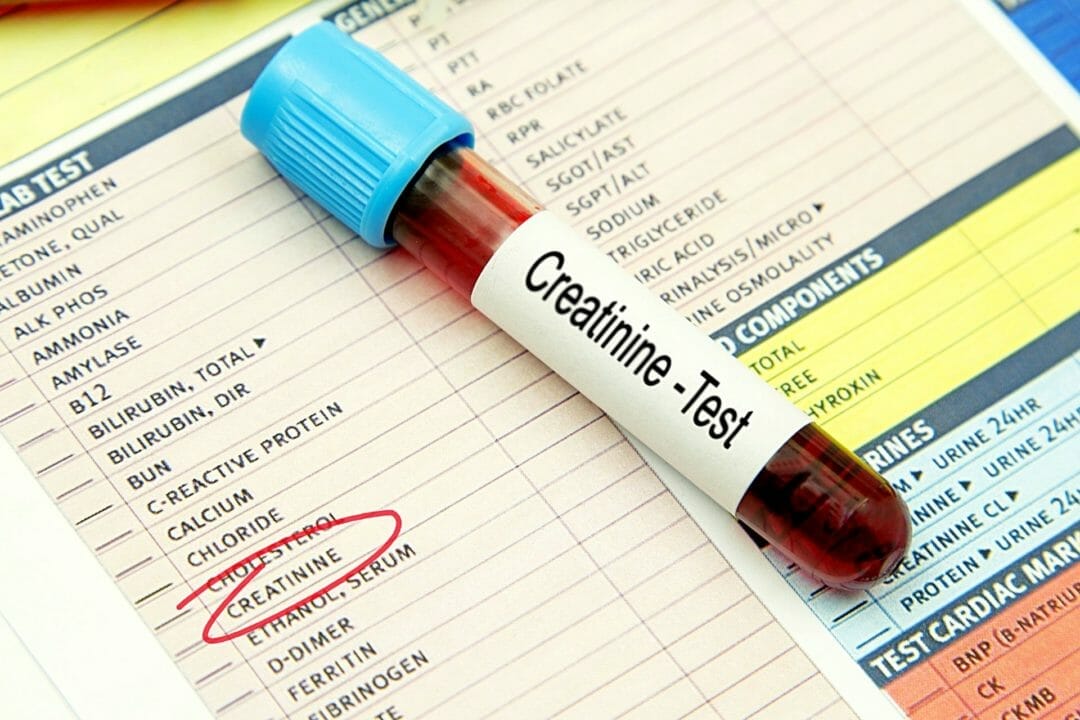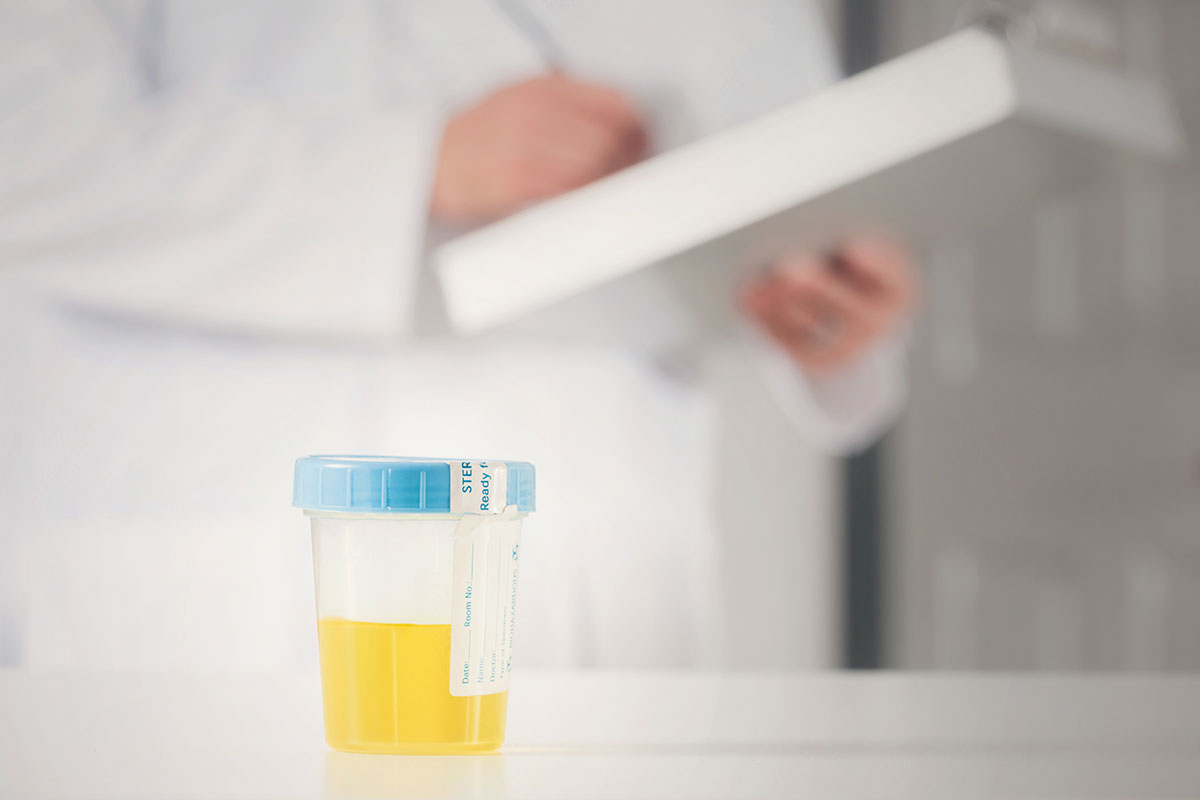If you’re reading this article, then you probably have an idea of what “creatinine” is. You might already know how useful it can be when it comes to determining kidney function.
But if you find yourself feeling lost, you’re not alone.
Figuring out what it really is and what high creatinine levels may mean can be confusing for many chronic kidney disease (CKD) patients.

We came up with this article to clear up some of that confusion. Along with defining creatinine, we’ll also be discussing many useful topics, like how to lower creatinine levels. We’ve even prepared a creatinine levels chart to help you assess your test results.
But before all that, let’s start with what creatinine really is and what it has to do with your kidneys.
What is creatinine and why does it matter?
Creatinine is a waste product of the body and is produced mainly through muscle activity. It’s normal for everyone to have some creatinine present in their blood. But it can’t just stay there.
Like other waste products, the creatinine in your bloodstream has to be removed.
This is a job for your kidneys: they filter creatinine out from your blood and excrete it from the body in urine.
By measuring the amount of creatinine found in someone’s body, doctors can get an idea of how well their kidneys are functioning. The special thing about creatinine is that it is produced at a constant rate, and filtered almost freely by the kidneys. This means that the creatinine in your body is at an equilibrium. When the kidneys are damaged, they filter waste materials less efficiently. This means the amount of creatinine in the blood usually increases.
Think of it this way. When you run the tap of a kitchen sink without plugging the drain, a small layer of water will collect. But the sink will not flow over. However, when you partially plug the drain, the water level will rise. It will continue to rise until a new, higher equilibrium is reached.
Your muscles are like the tap, the kidneys are like the drain and the creatinine levels in your blood are like the water. If your kidneys become damaged, the creatinine starts to increase.
Two Types Creatinine Tests

There are two tests that are used to figure out your kidney function: the serum creatinine test and the creatinine clearance test.
1. Serum Creatinine Test
This test measures the creatinine level in your blood. The serum creatinine test is a common blood test and usually requires no prior preparation. A member of your healthcare team will simply take a blood sample from you and have it analyzed in a laboratory.
This is often used as a preliminary test to determine the health of your kidneys.
As kidney function decreases, serum creatinine levels will increase. This can indicate a problem with your kidneys long before any other signs of CKD begin to appear.
Doctors will usually use additional information, along with the serum creatinine test, to determine your level of kidney function more accurately. This is to calculate your GFR or Glomerular Filtration Rate. It is the speed with which your kidneys can filter waste from your blood.
However, sometimes, the doctor may not completely trust the GFR. For example, if your egfr blood test kidney function is very low, or your muscle mass is far lower or higher than average. This is when a creatinine clearance test is more useful.
2. Creatinine Clearance Test

This test measures how well your kidneys can remove creatinine from your bloodstream. This is done by comparing the creatinine levels between your urine and your blood.
A creatinine clearance test requires both a blood sample, and a urine sample collected within a 24-hour period. Because of this, it involves more preparation and effort than a serum creatinine test. However, a creatinine clearance test is a much more precise estimate of actual kidney function, so it’s definitely worth doing.
Creatinine Levels Chart
Now that you have a clearer picture of what creatinine tests are all about, it’s time to move on the next part—understanding the results.
Serum creatinine is measured by the milligrams (mg) of creatinine per deciliter (dL) of your blood. The normal levels are:
- 0.6 - 1.2 mg/dL for adult males
- 0.5 - 1.1 mg/dL for adult females
Creatinine clearance is measured in milliliters (ml) of blood filtered per minute (min). The normal levels are:
- 97 - 137 ml/min for males
- 88 - 128 ml/min for females
If your numbers aren’t within these ranges, try to find them in the creatinine levels chart below:
Stages of Renal Failure | Men | Women | GFR Levels |
|---|---|---|---|
Normal | SC: 0.6-1.2 mg/dl | SC: 0.5-1.1 mg/dl | Higher than 90 ml/min |
Mild | SC: 1.3-1.9 mg/dl | SC: 1.2-1.9 mg/dl | 60 to 90 ml/min |
Moderate | SC: 2.0-4.0 mg/dl | SC: 2.0-4.0 mg/dl | 30 to 60 ml/min |
Severe | SC: > 4.0 mg/dl | SC: > 4.0 mg/dl | Less than 30 ml/min |
Important Note: For Serum Creatinine tests, see numbers in "SC" and for Clearance Rate tests see numbers in "CR".
It is important to emphasize that the numbers we have here are for general reference.
What is “normal” can vary according to certain factors, like age and race, for example. Also, laboratories can have varying methods of testing, which m
Reasons for High Creatinine Levels
We’ve said that high creatinine levels in your blood is a common indication of kidney damage. However, there are exceptions. Your nephrologists organize these based on three possible causes: pre-renal, renal, and post-renal. This means before the kidneys, in the kidneys, and after the kidneys.
Creatinine may temporarily increase due to certain conditions. These need to be considered when creatinine test results are being analyzed. Otherwise, it may lead to an inaccurate estimate of kidney function.
Here are some factors (aside from kidney damage) that may cause high creatinine levels:
Before renal Failure
1. Dehydration
Not drinking enough water makes it harder for kidneys to filter out creatinine effectively.
2. Muscle destruction
Any condition which causes the breakdown of muscle tissue increases creatinine in your blood.
3. Increased protein intake
If you have a high-protein diet, your creatinine levels will be higher than average.
4. Hypothyroidism
A dysfunction in your thyroid gland can influence your kidney function and decrease your kidneys' ability to filter wastes effectively.
5. Creatine supplements
Creatine is an amino acid that is frequently added to muscle-building supplements. Intake of these supplements can raise creatinine levels.
During Renal Failure
6. Certain medications
Some medications (like certain antibiotics and acid blockers) can raise creatinine, because they can damage the kidneys. Always consult with your doctor.
7. Other diseases
Some infections like Hanta virus or other diseases such as diabetes or high blood pressure can cause kidney damage.
After Renal Failure
8. Kidney Stones
Kidney stones may block the urine flow from your kidneys, and thereby reduce kidney function.
9. Other obstructions
Sometimes there are other reasons for urine flow to be blocked. The doctor can make an ultrasound to check if urine is flowing properly.
How to Lower Creatinine Levels
When you do have CKD and reduced kidney function, you should do all you can to avoid further damage.
You can help your kidneys by not overworking them, and one way to do that is to lower your blood creatinine levels. Less creatinine in your system means less waste for them to filter.
Here are some tips to help you do just that:
1. Hydrate accordingly
As we’ve mentioned, dehydration is one of the causes of elevated creatinine levels. Without enough water in your body, it becomes more difficult for your kidney to filter out creatinine and other waste products.
The generally recommended fluid intake is 6-8 glasses (8-oz / 250-ml) of water each day. But this might not apply to you if you have CKD. Too much liquid in the body can increase blood pressure which, in turn, puts more stress on your kidneys.
Consult your nephrologist or dietitian about setting a proper limit to your fluid intake.
2. Exercise (within your limits)
We all know that exercise is important to maintaining a healthy body. This is true even when you have kidney disease.
That said, it’s vital to know your limits. While the recommended amount of exercise for adults is at least 45 to 60 minutes, four to five times a week, it might be better for you to follow a less vigorous exercise plan.
Strenuous exercise increases muscle activity, which may lead to a buildup of creatinine in your system. To keep your creatinine levels stable, try your hand at more low impact routines, such as walking and yoga.
3. Consult your doctor about medications and supplements
We’ve talked about how certain drugs can increase creatinine in your blood. Some examples include:
- Acid blockers
- Certain antibiotics, such as gentamicin
- High cholesterol medications
- Nonsteroidal anti-inflammatory drugs, such as ibuprofen or naproxen.
- Supplements containing creatine
Ask your doctor if there are possible alternatives to any medications that you may need to avoid for your kidney disease.
If you’re taking supplements with creatine in them, it might be better for you to find an alternative that won’t raise your creatinine levels. Or you could go with a well-planned renal diet instead.
Additionally, kidney disease patients need to be careful about using herbal medicines. Some herbal products and remedies can actually worsen your condition due to their potassium and phosphorus content.
DO NOT change your medications without consulting with your doctor and DO NOT self-medicate.
4. Adjust your diet
Your diet plays an important role in controlling your creatinine levels.
As we’ve said, eating too much meat and protein-rich foods can lead to increased creatinine and more work for your kidneys. Now might be the time to re-evaluate your food choices and switch to more kidney-friendly options.
Of course, while too much protein isn’t good, so is not enough. You will need to find the right balance on your diet and set limits on your nutrient intake.
If you're considering a more plant-based diet (read more: tips on how to transition to a plant-based diet) but you're not sure which foods are good for your kidneys, check out this list of vegetables and fruits:
(serving size is 1/2 cup unless otherwise stated)
Fruits | Vegetables |
|---|---|
Apples (1 medium fruit) | alfalfa sprout |
Applesauce or juice | Asparagus, Raw (6 Spears) |
Apricots, canned in juice | Beans, Green Or Waxed |
Blackberries | Broccoli, Raw Or Cooked |
Blueberries | Cabbage, Green And/Or Red |
Cherries | Carrots, Cooked |
Cranberries | Cauliflower |
Fruit Cocktails | Celery (1 Stalk) |
grape, including juice | Corn, Fresh (1/2 Ear) |
Grapefruit (1/2 Of Fruit) | Cucumber |
Peaches (1 Small Fruit) | Eggplant |
Pineapple, Including Juice | Kale |
Plums (1 Whole Fruit) | Lettuce |
Raspberries | Peas, Green |
Strawberries | Radish |
Tangerine (1 Whole Fruit) | Rhubarb |
watermelon (1 cup) | Watercress |
Reminder: This is not a comprehensive list. Ideal diet may vary for each individual. Always consult your dietitian before making any diet change.
The Bottomline
You’ve reached the end of this article!
Hopefully, we’ve answered some of your questions about creatinine and how it relates to kidney function.
We’ve discussed a lot today: everything from what creatinine is, to the types of creatinine tests, interpreting lab results, and how to lower creatinine levels. If it feels like too much, don’t worry! You can always refer back to this article.
Creatinine is a very important part of your tracking and monitoring. Keeping control of your creatinine levels will help you manage your condition better and live a healthier life.
We hope that we’ve shared here today can get you one step further in delaying dialysis and maintaining your kidney health.
Creatinine test - Mayo Clinic;
https://www.mayoclinic.org/tests-procedures/creatinine-test/about/pac-20384646
What is the normal range for a creatinine blood test? - Medical News Today;
https://www.medicalnewstoday.com/articles/322380.php
The Use of Salvia for Patients with Renal Failure; Subhuti Dharmananda, Ph.D. - Institute of Traditional Medicine;
http://www.itmonline.org/arts/salviarenal.html
High Creatinine Levels on Your Blood Test? — Taking These 4 Drugs Can Cause a False Alarm; Dr. Sharon Orrange - GoodRx;
https://www.goodrx.com/blog/drugs-cause-false-high-creatinine-levels-blood-test/
Effect of Diet on Serum Creatinine in Healthy Subjects During a Phase I Study; Pimenta, Jensen, Jung, Schaumann, Boxnick, and Truebela - National Center for Biotechnology Information;
https://www.ncbi.nlm.nih.gov/pmc/articles/PMC5047024/


